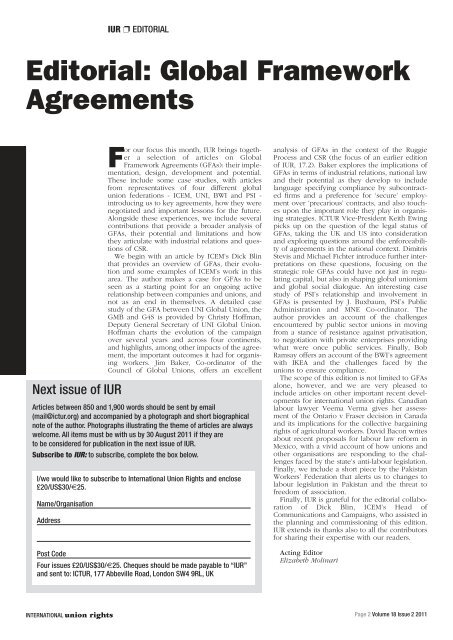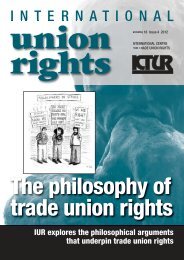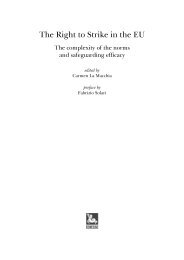IUR ❐ EDITORIALEditorial: <strong>Global</strong> <strong>Framework</strong><strong>Agreements</strong>Next issue of IURArticles between 850 and 1,900 words should be sent by email(mail@ictur.org) and accompanied by a photograph and short biographicalnote of the author. Photographs illustrating the theme of articles are alwayswelcome. All items must be with us by 30 August 2011 if they areto be considered <strong>for</strong> publication in the next issue of IUR.Subscribe to IUR: to subscribe, complete the box below.I/we would like to subscribe to <strong>International</strong> Union Rights and enclose£20/US$30/€25.Name/OrganisationAddressFor our focus this month, IUR brings togethera selection of articles on <strong>Global</strong><strong>Framework</strong> <strong>Agreements</strong> (GFAs): their implementation,design, development and potential.These include some case studies, with articlesfrom representatives of four different globalunion federations - ICEM, UNI, BWI and PSI -introducing us to key agreements, how they werenegotiated and important lessons <strong>for</strong> the future.Alongside these experiences, we include severalcontributions that provide a broader analysis ofGFAs, their potential and limitations and howthey articulate with industrial relations and questionsof CSR.We begin with an article by ICEM’s Dick Blinthat provides an overview of GFAs, their evolutionand some examples of ICEM’s work in thisarea. The author makes a case <strong>for</strong> GFAs to beseen as a starting point <strong>for</strong> an ongoing activerelationship between companies and unions, andnot as an end in themselves. A detailed casestudy of the GFA between UNI <strong>Global</strong> Union, theGMB and G4S is provided by Christy Hoffman,Deputy General Secretary of UNI <strong>Global</strong> Union.Hoffman charts the evolution of the campaignover several years and across four continents,and highlights, among other impacts of the agreement,the important outcomes it had <strong>for</strong> organisingworkers. Jim Baker, Co-ordinator of theCouncil of <strong>Global</strong> Unions, offers an excellentPost CodeFour issues £20/US$30/€25. Cheques should be made payable to “IUR”and sent to: ICTUR, 177 Abbeville Road, London SW4 9RL, UKanalysis of GFAs in the context of the RuggieProcess and CSR (the focus of an earlier editionof IUR, 17.2). Baker explores the implications ofGFAs in terms of industrial relations, national lawand their potential as they develop to includelanguage specifying compliance by subcontractedfirms and a preference <strong>for</strong> ‘secure’ employmentover ‘precarious’ contracts, and also touchesupon the important role they play in organisingstrategies. ICTUR Vice-President Keith Ewingpicks up on the question of the legal status ofGFAs, taking the UK and US into considerationand exploring questions around the en<strong>for</strong>ceabilityof agreements in the national context. DimitrisStevis and Michael Fichter introduce further interpretationson these questions, focusing on thestrategic role GFAs could have not just in regulatingcapital, but also in shaping global unionismand global social dialogue. An interesting casestudy of PSI’s relationship and involvement inGFAs is presented by J. Buxbaum, PSI’s PublicAdministration and MNE Co-ordinator. Theauthor provides an account of the challengesencountered by public sector unions in movingfrom a stance of resistance against privatisation,to negotiation with private enterprises providingwhat were once public services. Finally, BobRamsay offers an account of the BWI’s agreementwith IKEA and the challenges faced by theunions to ensure compliance.The scope of this edition is not limited to GFAsalone, however, and we are very pleased toinclude articles on other important recent developments<strong>for</strong> international union rights. Canadianlabour lawyer Veema Verma gives her assessmentof the Ontario v Fraser decision in Canadaand its implications <strong>for</strong> the collective bargainingrights of agricultural workers. David Bacon writesabout recent proposals <strong>for</strong> labour law re<strong>for</strong>m inMexico, with a vivid account of how unions andother organisations are responding to the challengesfaced by the state’s anti-labour legislation.Finally, we include a short piece by the PakistanWorkers’ Federation that alerts us to changes tolabour legislation in Pakistan and the threat tofreedom of association.Finally, IUR is grateful <strong>for</strong> the editorial collaborationof Dick Blin, ICEM’s Head ofCommunications and Campaigns, who assisted inthe planning and commissioning of this edition.IUR extends its thanks also to all the contributors<strong>for</strong> sharing their expertise with our readers.Acting EditorElizabeth MolinariINTERNATIONAL union rights Page 2 Volume 18 Issue 2 2011
FOCUS ❐ GLOBAL FRAMEWORK AGREEMENTS<strong>Global</strong> <strong>Framework</strong><strong>Agreements</strong>: ComplianceSince the 1990s, <strong>Global</strong> Union Federations(GUFs) have been signing <strong>Global</strong><strong>Framework</strong> <strong>Agreements</strong> (GFAs) withtransnational companies, sometimes initiated bynational unions in the home country of the company.For nearly as long, debate over the effectivenessof such voluntary instruments of socialresponsibility has arisen. Now, at a point whenthe <strong>International</strong> <strong>Trade</strong> Union Confederation(ITUC) is seeking a role <strong>for</strong> itself in GFAs, possiblywith ILO involvement, it might be wise toexamine the practical implementation of GFAs,and necessary elements to voluntary complianceand en<strong>for</strong>cement.A GFA is a pact between a company and itsemployees, through recognised trade unionsincluding a GUF or GUFs. GFAs commit a companyto respecting global labour standards and torespect other cited benchmarks of ethical human,environmental and other conduct in all its worldwideoperations. The basic premise behind GFAsis that the best standards adopted by a companyin any one workplace ought to be standardisedeverywhere it has workplaces.At base is adherence to language spelling outrecognised global standards on trade unionrights, namely ILO Conventions 87 and 98 andoftentimes others, as well as international socialinstruments like the OECD Guidelines <strong>for</strong>Multinational Enterprises, the ILO TripartiteDeclaration of Principles ConcerningMultinational Enterprises, and other globallyrecognised frameworks. Language regardingworkplace health and safety and good stewardshipof the environment are common in GFAs, asis training, education, and career enhancement,which is seen as beneficial to both workers andemployers regarding quality of life improvementand employee longevity that builds sustainablebusinesses.In order to make GFAs work, these tenets mustbe tested frequently through local actions andconstant engagement between levels of managementand GUFs, national and local unions andworkers on the shop floor. An effective GFA isone that delivers benefits to both parties; recognition,respect, and continual dialogue <strong>for</strong> tradeunions, tangible workplace improvements <strong>for</strong>staff and authentic social credibility <strong>for</strong> companies.A GFA must be seen as a tool, not an endin itself. It is not an alternative to a local collectiveagreement, but if implemented and maintainedproperly, it can be the backdrop <strong>for</strong> atrusting, consensual, constructive labour-managementrelationship that improves the lives ofworkers.It is crucial to remember that GFAs are not“agreements” in any <strong>for</strong>mal sense of the word.There is nothing binding in them, there are onlynarrow check-and-balance systems, and companiessometimes view them, un<strong>for</strong>tunately, as apublic relations exercise, perhaps understandingthat they cannot get similar attention with internalcodes of conduct.Evolution of GFAsGUFs have placed different priority levels onGFAs. Some have stopped trying to attain themaltogether. Others diligently negotiate them, againsometimes with national affiliates, sometimes not,only to leave them sit idle and gather dust. OtherGUFs set numbers as goals to achieve GFAs withlittle regard to the language contained in it.Inherent in the signing of GFAs, the ICEMbelieves, is a duty to put them into play at companyworksites. There is also a duty to reviewthem regularly with companies in order toimprove and add language. The ICEM strives topress on the practical implementation of commitmentsmade inside GFAs. This has basically followedtwo tracks. One is joint missions with thecompany to monitor specific language in theagreement. This might include workers’ rights,health and safety, or new technologies or jobskills. The other is seeking out, exposing, andthen correcting infractions that occur on the locallevel.To be effective, this latter method of compliancedepends on communication, networkingand timeliness. It takes consistent communicationand networking between the union partners andit means thorough analysis on what to presentsenior managers and how to present it so thatcorrections are immediately made. Too often,senior corporate leaders fail to communicate GFAcommitments to regional and local managers,and GUFs – in the “gathering dust” scenario – failto engage national and local unions on properimplementation of GFAs.This last point is a serious flaw on the union sideof GFAs. It is vitally important that GUFs buildcompany networks with national and local unions,urging them to probe their worksites to ensurecompliance. It is also important that GUFs build thecapacity <strong>for</strong> research and analysis of the company,using both internal and external in<strong>for</strong>mation.ICEM Recent CasesThe ICEM’s overall experience on implementationand compliance has been mixed, but it hasimproved over the last several years. The ICEMhas 15 GFAs and activities are increasing withinmost of them. There are a number of examples ofthis.Perhaps the most advanced relationship mightbe with the French chemical company Rhodia.A GFA must beseen as a tool,not an end initself. It is not analternative to alocal collectiveagreement, but …it can be thebackdrop <strong>for</strong>a trusting,consensual,constructivelabourmanagementrelationship thatimproves the livesof workersDICK BLIN is Head ofCommunications andCampaigns <strong>for</strong> the<strong>International</strong> Federation ofChemical, Energy, Mine andGeneral Workers’ Unions(ICEM)Page 3 Volume 18 Issue 2 2011INTERNATIONAL union rights





